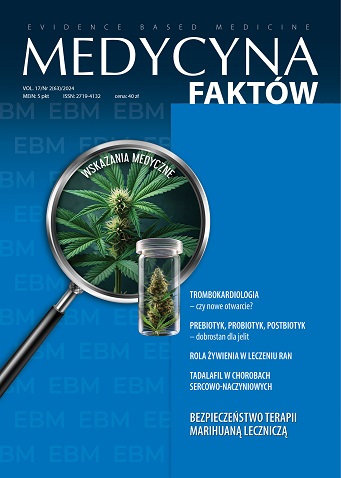Skojarzona farmakoterapia lerkanidypiną w wybranych sytuacjach klinicznych Artykuł przeglądowy
##plugins.themes.bootstrap3.article.main##
Abstrakt
Farmakoterapia nadciśnienia tętniczego ma na celu nie tylko redukcję ciśnienia krwi, ale także wpływ na inne czynniki ryzyka chorób sercowo-naczyniowych. Kompleksowe podejście terapeutyczne jest kluczowe dla obniżania ogólnego ryzyka zgonu. Leczenie nadciśnienia tętniczego opiera się na modyfikacji stylu życia oraz farmakoterapii. Obecnie według standardów zalecana jest farmakologiczna terapia złożona (czyli składająca się z więcej niż jednego leku), zwłaszcza u pacjentów z dodatkowymi czynnikami ryzyka. Badania wskazują, że u wielu chorych na cukrzycę lub przewlekłą chorobę nerek osiągnięcie zalecanych wartości ciśnienia często wymaga zastosowania co najmniej trzech leków hipotensyjnych. U pacjentów z zaburzeniami psychiatrycznymi, m.in. depresją, konieczne jest całościowe podejście kliniczne i adekwatna farmakoterapia zaburzeń nastroju oraz chorób internistycznych.
##plugins.themes.bootstrap3.article.details##
Copyright by Medical Education. All rights reserved.
Bibliografia
2. Mancia G, Kreutz R, Brunström M et al. 2023 ESH Guidelines for the management of arterial hypertension The Task Force for the management of arterial hypertension of the European Society of Hypertension: Endorsed by the International Society of Hypertension (ISH) and the European Renal Association (ERA). J Hypertens. 2023; 41(12): 1874-2071.
3. Bakris GL. Maximizing cardiorenal benefit in the management of hypertension: achieve blood pressure goals. J Clin Hypertens (Greenwich). 1999; 1: 141-147.
4. Hayek SS, Ko Y-A, Awad M et al. Depression and chest pain in patients with coronary artery disease. Int J Cardiol. 2017; 230: 420-6.
5. Gosse P, Sheridan DJ , Zannad F et al. Regression of left ventricular hypertrophy in hypertensive patients treated with indapamide SR 1.5 mg versus enalapril 20 mg: the LIVE study. J Hypertens. 2000; 18(10): 1465-75.
6. Holzgreve H, Risler T, Trenkwalder P. Efficacy and tolerability of the perindopril/indapamide combination therapy for hypertension: the PRIMUS study. Curr Med Res Opin. 2006; 22: 1849-58.
7. Patel A; ADVANCE Collaborative Group; Mac-Mahon S, Chalmers J, Neal B et al. Effects of a fixed combination of perindopril and indapamide on macrovascular and microvascular outcomes in patients with type 2 diabetes mellitus (the ADVANCE trial): a randomised controlled trial. Lancet 2007; 370: 829-40.
8. Robles NR, Ocon J, Gomez CF et al. Lercanidipine in Patients with Chronic Renal Failure: The ZAFRA Study. Ren Fail. 2005; 1: 73-80.
9. Beckett NS, Peters R, Fletcher AE et al. Treatment of hypertension in patients 80 years of age or older. N Engl . Med. 2008; 358: 1887-9
10. Cherubini A, Fabris F, Ferrari E et al. Comparative effects of lercanidipine, lacidipine, and nifedipine gastrointestinal therapeutic system on blood pressure and heart rate in elderly hypertensive patients: the ELderly and Lercanidipine (ELLE) study. Arch Gerontol Geriatr. 2003; 37: 203-12.
11. PROGRESS Collaborative Group. Randomised trial of a perindopril-based blood-pressure-lowering regimen among 6,105 individuals with previous stroke or transient ischaemic attack. Lancet 2001; 358: 1033-41.
12. The ONTARGET Investigators. Telmisartan, ramipril or both in patients at high risk for vascular events. N Engl J Med. 2008; 358: 1547-59.
13. Neldam S, Edwards C; ATHOS Study Group. Telmisartan plus hydrochlorothiazide compared with amlodipine plus hydrochlorothiazide in older patients with systolic hypertension: results from a large ABPM study. Am J Geriat Cardiol. 2006; 15: 151-60.
14. Barnett AH, Bain SC, Bouter P et al.; Diabetics Exposed to Telmisartan and Enalapril Study Group. Angiotensin-receptor blockade versus converting- enzyme inhibition in type 2 diabetes and nephropathy. N Engl J Med. 2004; 351: 952-61.
15. Schmieder RE, Delles C, Mimran A et al. Impact of telmisartan versus ramipril on renal endothelial function in patients with hypertension and type 2 diabetes. Diabetes Care. 2007; 30: 1351-56.
16. 1Chen C, Kassan A, Castaneda D et al. Metformin prevents vascular damage in hypertension through the AMPK/ER stress pathway. Hypertens Res. 2019; 42; 960-69.
17. Kapłon-Cieślicka A, Filipiak KJ. Dipeptidylpeptidase-4 inhibitors in the treatment of type 2 diabetes. Choroby Serca i Naczyń. 2012; 9(5): 263-72.
18. Mohammed I, Hollenberg MD, Ding H et al. A Critical Review of the Evidence That Metformin Is a Putative Anti-Aging Drug That Enhances Healthspan and Extends Lifespan. Front Endocrinol. 2021; 5(12): 718942.
19. Green JB, Bethel MA, Armstrong PW et al. Effect of Sitagliptin on Cardiovascular Outcomes in Type 2 Diabetes. N Engl J Med. 2015; 373: 232-42.
20. Saran RK, Puri A, Agarwalc M. Depression and the Heart. Indian Heart J. 2012; 64(4): 397-401.
21. Zhang L, Li G, Liu M. A meta-analysis on the association between SSRIs and blood pressure in patients with CVD and depression. J Affect Disord. 2023; 340: 181-8.
22. Tully PJ, Peters R, Péres K et al. Effect of SSRI and calcium channel blockers on depression symptoms and cognitive function in elderly persons treated for hypertension: three city cohort study. Int Psychogeriatr. 2018; 30(9): 1345-54.
23. Ranjbar F, Akbarzadeh F, Asadlou M. The Effects of Sertraline in Controlling Refractory Hypertension in Women with Premenstrual Syndrome. Iran J Psychiatry. 2016; 11(4): 234-8.
24. Woroń J, Siwek M, Gorostowicz A. Adverse effects of interactions between antidepressants and medications used in treatment of cardiovascular disorders. Psychiatr Pol. 2019; 53(5): 977-95.
